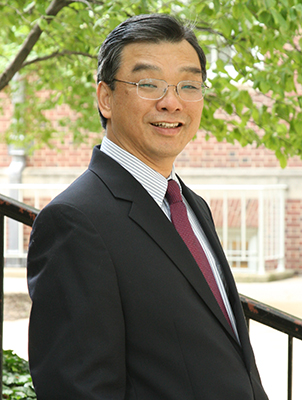Apr 22, 2024
Gies professor launches AccelCorps™ to bridge STEM and business
Gies College of Business has joined forces with the U.S. National Science Foundation (NSF) to launch AccelCorps™, a groundbreaking pilot program that empowers academics to translate their research into marketable products and companies.
The pilot program currently underway is designed and led by a Gies Professor of Business Administration, Joseph Cheng, an expert on global innovation and entrepreneurship. The initiative is funded by a 3-year, $5 million NSF grant aimed at training innovators in science, technology, engineering, and mathematics (STEM) fields about navigating the process of commercialization and startup business creation.
“The new entrepreneurial training aligns with the goals of the ‘CHIPS and Science Act of 2022,’” said Erwin Gianchandani, NSF assistant director for Technology, Innovation and Partnerships (TIP). “It will serve to accelerate the translation of research and increase the successful commercialization of key technology areas, thereby strengthening U.S. economic competitiveness.”
Equipping Academics for Entrepreneurial Success

“AccelCorps™ equips academic researchers with the knowledge and confidence they need to launch startups that commercialize the technology resulting from their research,” said Cheng.
The pilot program builds on and extends NSF’s existing Innovation Corps (I-CorpsTM) training focused on customer discovery, which is widely recognized as a critical and foundational component in technology commercialization. Currently, AccelCorps™ only accepts participants who have already been admitted into the National I-Corps program.
But more is needed to ensure entrepreneurial success. “Until now, there has not been a comprehensive approach to entrepreneurial development in STEM. AccelCorps™ goes beyond customer discovery to include training on other aspects of the technology commercialization process, and most importantly, provides a supportive environment where participants can apply their learnings through practice,” said Cheng.
From Training to Market Launch
The program begins with an orientation workshop to introduce participants to the opportunities and challenges in technology commercialization, including shifting the mindset from an academic researcher to a business entrepreneur. This is followed by an immersive, seven-week I-Corps training program to identify customer segments and begin to validate the business model. Each team of at least three participants – typically, a faculty member, postdoc or graduate student, and an industry mentor – must conduct interviews with at least 100 potential customers and other stakeholders in their industry ecosystem to gain insights into the market needs of the technology they wish to commercialize.
The pilot program then provides training on startup launch and management, culminating in a four-month accelerator boot camp that provides mentorship, support services, and advanced commercialization training to help teams launch and scale a business venture.
Scaling the Impact
“The ultimate goal of AccelCorps™ is to reduce the risk and increase the translation of academic research into businesses that contribute to job creation and economic growth in the U.S.,” said Cheng. “Following the pilot, we hope to scale the program to empower academic researchers in STEM fields across the country, preparing them to secure public funding from programs such as NSF’s Small Business Innovation Research/Small Business Technology Transfer (SBIR/STTR) program as well as private funding to launch their startups.”
This initiative underscores Gies Business’ commitment to fostering innovation and entrepreneurship, according to Jeffrey R. Brown, Josef and Margot Lakonishok Professor in Business and Dean at Gies Business.
“The velocity of change in business today requires substantial entrepreneurial capabilities,” said Brown. “We’re thrilled about this opportunity to partner with NSF to accelerate the impact of academic research on the U.S. economy.”


